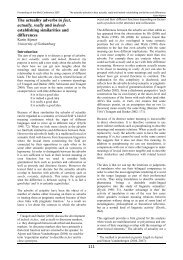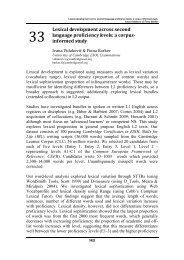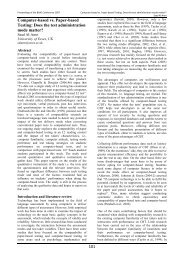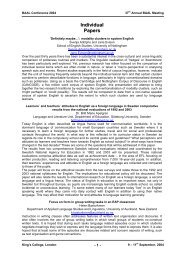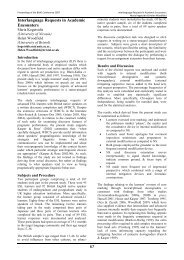Proceedings of the - British Association for Applied Linguistics
Proceedings of the - British Association for Applied Linguistics
Proceedings of the - British Association for Applied Linguistics
You also want an ePaper? Increase the reach of your titles
YUMPU automatically turns print PDFs into web optimized ePapers that Google loves.
14<br />
Relevance and Influence <strong>of</strong> Phraseological Phenomena in Native and Non-native Text Production<br />
Cordula Glass<br />
Relevance and Influence <strong>of</strong> Phraseological<br />
Phenomena in Native and Non-native Text<br />
Production<br />
Cordula Glass<br />
University <strong>of</strong> Erlangen-Nurmberg<br />
cordula.glass@angl.phil.uni-erlangen.de<br />
A native-like linguistic competence is <strong>of</strong>ten quoted as one <strong>of</strong> <strong>the</strong> main<br />
objectives <strong>of</strong> advanced language teaching. Yet despite a good command <strong>of</strong><br />
lexis and syntax, few learners become truly pr<strong>of</strong>icient users <strong>of</strong> <strong>the</strong>ir<br />
selected target language. “It’s not wrong but it’s not proper English ei<strong>the</strong>r”<br />
is what students <strong>of</strong>ten hear (Wray, 2000). There<strong>for</strong>e this study took a closer<br />
look at learners’ lexical choice with respect to language perception in<br />
general and judgment <strong>of</strong> nativeness in particular.<br />
A special focus concentrated on phraseological phenomena, which are - as<br />
Hausmann (1984) already pointed out thirty years ago - particularly<br />
challenging <strong>for</strong> learners <strong>of</strong> a <strong>for</strong>eign language. In more recent studies<br />
Waible (2008) and de Cock (1999) were able to show that native speakers<br />
and learners <strong>of</strong> English use indeed different phraseological expressions and<br />
are <strong>the</strong>re<strong>for</strong>e easy to identify. Yet, Mittmann (2004) argues that this would<br />
also be true <strong>for</strong> speakers from different varieties <strong>of</strong> English, so <strong>the</strong> question<br />
remains, if <strong>the</strong>se differences play any role as far as <strong>the</strong> judgment <strong>of</strong> a<br />
speaker’s linguistic ability is concerned.<br />
In a corpus-based analysis a database <strong>of</strong> over 120 non-native and native<br />
texts has been analysed according to characteristic phraseological features.<br />
These results were <strong>the</strong>n used as a basis <strong>for</strong> a more qualitative approach:<br />
Following <strong>the</strong> methodology <strong>of</strong> Herbst (1992), native and non-native<br />
teachers <strong>of</strong> English as well as native and non-native speakers without any<br />
background in EFL teaching were asked to evaluate a sample <strong>of</strong> eight texts.<br />
These texts were all based on <strong>the</strong> same picture story and written by more<br />
and less competent L1 and L2 speakers <strong>of</strong> English. With <strong>the</strong> help <strong>of</strong> an<br />
online questionnaire <strong>the</strong>se short stories were <strong>the</strong>n subdivided into short<br />
paragraphs, which <strong>the</strong> participants assessed and ranked in terms <strong>of</strong><br />
“nativeness”.<br />
In most cases, correct English phrasing did indeed have an impact on <strong>the</strong><br />
perception <strong>of</strong> its reader. Unsurprisingly, native speakers <strong>of</strong> English have<br />
77



